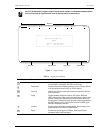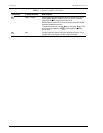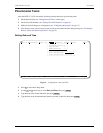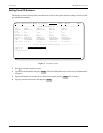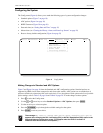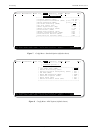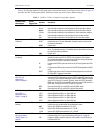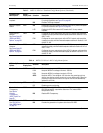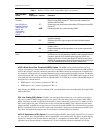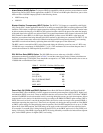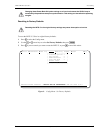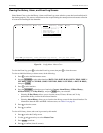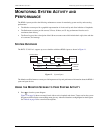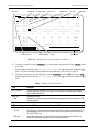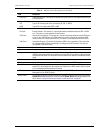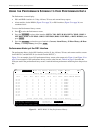
LTPH-UM-1031-03, Issue 3 Provisioning
H4TU-C-319 List 1 September 12, 2003 21
HDSL4 Block Error Rate Threshold (HBER) Option. The HBER option permits monitoring of loop
integrity and reporting of alarms when excessive errors are detected. The performance monitoring (PM) primitive
used for this purpose is the CRC checksum performed on the HDSL4 frame for both directions of transmission.
It is, therefore, called a block error rate rather than the bit error rate associated with the DS1 interface. The Monitor
screen displays the CRC errors and counts for both the H4TU-C and H4TU-R. The HBER option allows an alarm
to be generated if the total number of CRCs at either the H4TU-C or H4TU-R exceeds the selected BER threshold
during the last 1-minute interval.
• HBER option = 1E-6. Alarm is generated if CRC > 93
• HBER option = 1E-7. Alarm is generated if CRC > 9
Once initiated, the HBER count clears when the CRC count drops below the selected threshold. Selecting NONE
inhibits this alarm.
DS1 Line Coding (DS1) Option. The DS1 line code option should always be set to conform to the type of
DS1 service (AMI or B8ZS) being provided by the system. The Auto mode, which can adapt to either AMI or
B8ZS, should only be used in applications that require it (such as when ADC system acts as a standby circuit to
DS1 circuits whose line codes are not known or may be both AMI and B8ZS). This is because the Auto mode
induces one BPV in the DS1 bit stream whenever it switches from AMI to B8ZS. The Auto mode allows both the
H4TU-C and the H4TU-R to set its DS1 output code to that which is being received at the distant end DS1 input.
This forces the input and the output codes in each direction of transmission to be identical.
H4TU-C Equalization (EQL) Option. The equalizer shapes the DS1 output signal of the H4TU-C to conform
to a very specific pulse template when it arrives at the DSX-1 cross-connect point. The degree of pulse-shaping
required is a function of the distance between the H4TU-C’s equipment bay and the DSX-1 panel. Thus, the
equalizer has six discrete settings, in increments of 133 feet to cause the maximized separation of 655 feet.
HDSL4 BER
Threshold
HBER 1E-6 System alarm relay contact closes and the Status LED flashes red when the
Block Error Rate (BER) exceeds 10
-6
. (Block Error Rate is based on the
definition of Bit Error Rate.)
See “HDSL4 Block
Error Rate Threshold
(HBER) Option” on
page 21 and
“System Alarm
Output Pin” on
page 63.
1E-7 System alarm relay contact closes and the Status LED flashes red when BER
exceeds 10
-7
.
NONE Prevents generation of a system alarm due to BER.
SmartJack Loopback LPBK ENA Enables the HDSL4 system to recognize all inband SmartJack (SMJK)
loopback commands.
DIS Configures the HDSL4 system to ignore all inband SmartJack loopback
commands.
Minor Alarm ALM ENA Enables the generation of the output alarm on pin H when a system alarm
condition occurs.
DIS Disables the generation of the output alarm on pin H when a system alarm
condition occurs.
Remote Disconnect
Alarm
RDA ENA Enables a remote DS1 LOS condition at the input to the H4TU-R to generate
an LOS alarm. AIS or LOS (depending on ALMP) is sent towards the network.
DIS Prevents a remote DS1 LOS condition at the input to the H4TU-R from
causing an LOS alarm. The front-panel Status LED still flashes red and the
ALRM RLOS message appears, but the alarm relay contacts do not close and
LOS is sent towards the network from the H4TU-C instead of AIS.
Table 6. H4TU-C-319 List 1 ADC Config Menu Options (Continued)
ADC Config Menu
Options
Screen
Display Code
Selection Description



